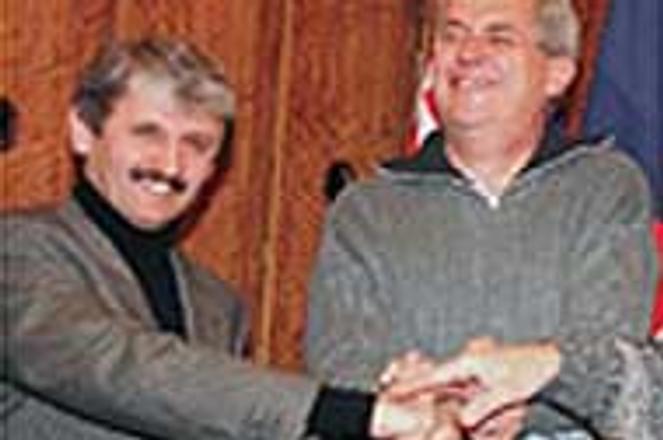A new Visegrad Four alliance has emerged between Slovak PM Dzurinda (left) and Czech PM Zeman (second left).photo: TASR
A weekend meeting between the leaders of the 'Visegrad Four' countries - Poland, the Czech Republic, Hungary and Slovakia - left the participants split over whether to impose visa restrictions on the Ukraine. The Czechs and Slovaks have vowed to restrict the free movement of Ukraine nationals across their borders by the end of this year, while the Poles and Hungarians said that their economic and social ties with the Ukraine were too close to permit such a move.
The October 15-16 meeting in Slovakia's High Tatras was attended by Slovak Prime Minister Mikuláš Dzurinda and Czech Prime Minister Miloš Zeman. While this pair found common ground on the Ukraine visa issue, they were opposed by Poland's Jerzy Buzek and Hungarian Prime Minister Viktor Orban, who urged caution.
"Slovakia knows that the visa regime won't stop organised crime from crossing our eastern border, but it will at least make the rules more complicated for both Ukrainian mafia and illegal workers," said Slovak Foreign Minister Eduard Kukan at a press conference on October 18. Kukan explained that Slovakia viewed the visa question in the context of European integration and the need to co-ordinate its border control policy with the Czech Republic.
The European Union since 1995 has compiled a 'black list' of countries whose nationals, the EU feels, should not be allowed to enter EU member states without visas. Ukraine, along with Russia and Belorussia, are on the list.
Although the EU only recommends visa policies for member countries, one of the union's main requirements for countries applying for EU membership is that they bring their border policies into harmony with that of the EU.
A source from the Polish Embassy in Bratislava told The Slovak Spectator on October 18 that Poland wasn't planning to impose a visa regime on the Ukraine in the near future. "We have a much longer border with Ukraine than Slovakia does. Every day there is a huge exchange in trade, and many Polish people live from this trade," said the source, who spoke on condition of anonymity.
Polish diplomats in Bratislava estimate that as many as an one million Ukrainians cross the border into Poland every year. "At the moment we have only three Polish consulates in the Ukraine, and it simply isn't possible with such a small capacity to issue one milion visas a year," the embassy source said. The Polish government, the source added, was aware that it would have to impose a visa regime on the Ukraine sooner or later, but prefered to delay the inevitable as long as possible.
Hungarian diplomats in Bratislava explained the reluctance of their government to impose a visa on the Ukraine as natural given the number of people of Hungarian descent who live in the Ukraine. But like their Polish counterparts, they said that Hungary would install a visa regime on the Ukraine if necessary.
In other business discussed at the informal V4 meeting, the leaders agreed to establish a jointly-financed Visegrad Fund for the support of regional cultural, educational and sporting programmes. The Fund is to be based in Bratislava, and to have a budget of one million euros. The V4 members will also work together to fight organised crime, to solve the problems of their Romany populations, and to administer the arms industry.
Both Polish and Hungarian diplomats downplayed the importance of the disgreement over visas for the Ukraine, saying that the issue would be discussed by V4 experts at the end of November.
But Pavol Lukáč, a political analyst with the SFPA foreign policy thinktank, said on October 20 that the disagreement at the summit showed that the V4 needed to hammer out a a common foreign policy. "V4 countries agree mostly on EU and NATO integration issues," said Lukáč. "But they don't yet have, and won't any time soon, a common policy towards the Ukraine, Russia or Yugoslavia."
Until this year, the V4 has been little more than a talking shop since its founding in 1992, with the Czech Republic in particular choosing to pursure membership in western alliances over the regional club, and Slovakia's Vladimír Mečiar opposed to effective co-operation. But after a May 14 V4 summit in Bratislava, Slovakia's Kukan declared that the V4 had been raised from the dead. "Visegrad is no longer just a symbol," he said.


